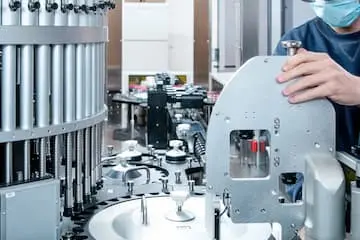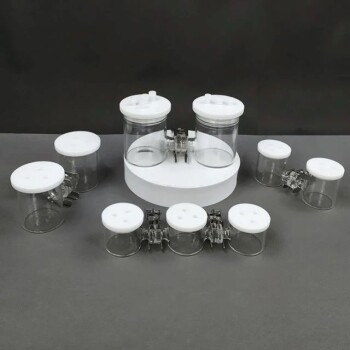The H-type electrolytic cell is a unique electrochemical cell that consists of two connected electrochemical cells. It features a replaceable membrane seal, multiple electrode feedthroughs, and gas inlet/outlet for easy degassing. Electrolysis, a process that uses electrical energy to drive a non-spontaneous redox reaction, is frequently employed to break down chemical substances. An H-type electrolytic cell is used for electroplating and to break down typically stable or inert chemical substances in solution.
Toggle Categories
Get Instant Support
Choose your preferred way to connect with our team
-
Get Free Quote Fill out form for detailed pricing
-
Send Email Detailed inquiry support
-
WhatsApp Quick mobile chat
Response Time
Within 8 hours on working days, 24 hours on holidays
h type electrolytic cell

H-Type Double-Layer Optical Electrolytic Electrochemical Cell with Water Bath
Item Number: ELCHD
$269.00
We have the best H Type Electrolytic Cell solutions available in the market. Our extensive portfolio guarantees that we have an appropriate standard solution that will meet your needs
Applications of H Type Electrolytic Cell
- Production of high-purity aluminum
- Electrorefining of non-ferrous metals such as copper and zinc
- Electrowinning of metals
- Electroplating of metals such as copper, nickel, and chromium
- Decomposition of chemical compounds like water into hydrogen and oxygen
- Production of caustic soda
Advantages of H Type Electrolytic Cell
- The H-type replaceable membrane sealed electrolytic cell is featured with replaceable membrane seal, a gas inlet and outlet for easy degassing, and multiple electrode feedthroughs for working electrodes, counter electrodes, and reference electrodes.
- This type of cell provides greater stability and accuracy in electrochemical experiments due to its sealed design.
- The H-type electrolytic cell allows for greater flexibility in electrode placement, which enables more complex experiments to be conducted.
- The replaceable membrane seal feature of this type of cell allows for easier maintenance and repairs, which reduces downtime in the lab.
- H-type electrolytic cells are widely used in research and industrial applications due to their high efficiency in producing high-purity metals and other materials.
Our H Type Electrolytic Cell is a cost-effective and highly customizable solution for your laboratory needs. With our custom design service, we can cater to your specific requirements, ensuring that you get the exact product you need.
FAQ
What Is The H Type Of Electrochemical Cell?
What Is H-cell Used For?
What Is The H Type Microbial Fuel Cell?
How Many Types Of Electrolytic Cells Are There?
What Is The H Cell For Hydrogen Permeation Experiments?
REQUEST A QUOTE
Our professional team will reply to you within one business day. Please feel free to contact us!
Related Articles

Escaping the Black Box: The Architecture of Insight in Electrochemistry
Unlock the correlation between visible phenomena and electrical data. A deep dive into the engineering and application of side-window optical electrolytic cells.

The Architecture of Invisibility: Deconstructing the "All-Quartz" Cell
An engineering deep dive into the construction of electrolytic cells. Why material interfaces matter, and how to choose between quartz and glass for data integrity.

The Glass Heart: Why Good Science Dies in Dirty Cells
The reliability of your electrolytic cell isn't just about chemistry; it's about discipline. Learn the systemic protocols for quartz and electrode maintenance.

The Architecture of Precision: Mastering Electrolytic Cell Maintenance
Reliable data starts with disciplined maintenance. Discover the psychological and technical approach to preserving electrolytic cells for peak performance.

The Vessel of Truth: Why the Container Matters More Than the Chemistry
The success of an electrolytic experiment often hangs on the material of the cell body. Discover the trade-offs between Borosilicate, Quartz, and PTFE.

The Symphony of Coefficients: Why Your Electrolytic Cell Cannot Be a Monolith
Glass withstands heat; PTFE does not. Understanding the thermal conflict in five-port electrolytic cells is key to preventing equipment failure.

The Anchor of Truth: Why Physical Stability Defines Electrochemical Success
In electrochemistry, data integrity begins with physical stability. Discover why securing your electrolytic cell is the most critical step in your experiment.

The Transparency Paradox: Mastering the Fragile Art of Electrolytic Cells
Glass electrolytic cells are precision instruments, not simple containers. Learn the systematic approach to handling glass to ensure safety and data integrity.

The Silent Deformation: Why Good Intentions Break Precision Glassware
Discover the critical thermal limits of double-layer electrolytic cells. Learn why heating the assembly destroys precision and how to ensure experimental integrity.

The Thermodynamics of Patience: Mastering the Five-Port Cell
Precision in electrochemistry requires balancing thermal control with material limits. Learn to manage heat without compromising your PTFE seals or data integrity.

The Geometry of Control: Inside the Super-Sealed Electrolytic Cell
Why the 10-100ml volume and 5-aperture design became the gold standard for electrochemical precision, and how to choose the right setup.

The Geometry of Truth: Why the Electrolytic Cell Dictates Experimental Success
Precision in electrochemistry relies on the vessel as much as the reaction. Explore the 50-500ml standard, the three-electrode system, and the art of cell design.

The Invisible Architecture of Accuracy: Optimizing the Five-Port Electrolytic Cell
Master the critical pre-use protocols for five-port water bath electrolytic cells. Learn how meticulous preparation ensures reproducible electrochemical data.

The Geometry of Control: Why 1 cm² Defines Electrochemical Success
Discover why the standard 1 cm² reaction area and precision O-ring sealing create the necessary baseline for repeatable, accurate electrochemical data.

The Architecture of Accuracy: Inside the Five-Port Electrolytic Cell
Precision in electrochemistry relies on controlling the environment. Explore the engineering behind the five-port water bath cell and how it eliminates variables.

The Fragile Vessel of Truth: A Maintenance Manifesto for Electrolytic Cells
Data integrity relies on equipment health. Discover the psychological and technical art of maintaining five-port electrolytic cells for reproducible science.

The Choreography of Electrons: Why Precision Demands a Trinity
Precision in coating evaluation isn't about power; it's about separation. Discover why the three-electrode system is the only way to silence electrochemical noise.

The Fragility of Precision: Mastering the Integrity of Five-Port Electrolytic Cells
Prevent leaks in electrolytic cells through systematic inspection and proper assembly. A guide to mastering experimental seal integrity and reliability.

The Silent Variable: Why Material Purity Defines Electrochemical Truth
Discover why the all-quartz electrolytic cell is the hidden standard for high-precision electrochemistry, photoelectrochemistry, and contamination control.

The Art of Resistance: Why Your Electrolytic Cell Needs Breathing Room
Short circuits in electrolytic cells aren't just accidents; they are geometry failures. Learn how to control the electrical path and protect your lab equipment.

